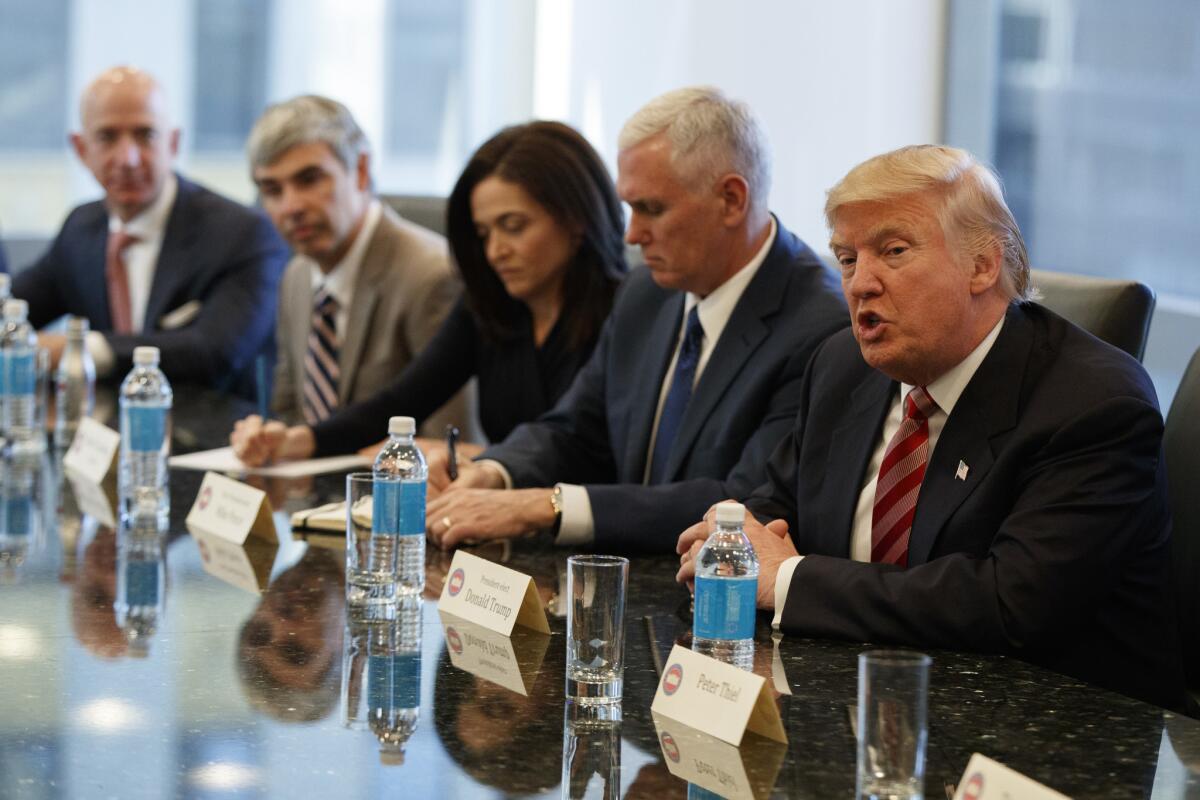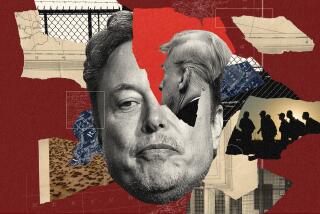What happened when Silicon Valley went to Trump Tower

President-elect Donald Trump meets with technology industry leaders at Trump Tower in New York on Wednesday. From left are Amazon founder Jeff Bezos, Alphabet CEO Larry Page, Facebook COO Sheryl Sandberg, Vice President-elect Mike Pence and Trump.
Reporting from Washington — It wasn’t so much a reckoning as a reboot.
The nation’s top tech executives couldn’t know what to expect when they headed to Trump Tower in Manhattan on Wednesday for what President-elect Donald Trump’s transition team had billed as an innovation “summit.” They had reason to fear an ambush.
But if Trump holds grudges against Silicon Valley for the way that many of its denizens maligned and ridiculed him at every step of the presidential campaign, he worked hard not to let them show.
If Trump’s opening comments were any indication, this was no repeat of that ill-fated meeting he called with broadcast and cable TV news executives days after the election, during which he mostly dressed them down.
If any grudges were in the air, they were over who was not in the 25th floor meeting room Wednesday.
Trump’s favorite social media platform, Twitter, was absent, for example. Politico attributed it to retribution for the company refusing during the campaign to abide Trump’s request to generate a #CrookedHillary emoji.
Twitter’s refusal to create a digital running stick figure holding a money bag is a grievance that his director of digital advertising aired on Medium a few weeks ago.
Trump representatives denied that was why Twitter was left out of the high-tech confab. They said Twitter didn’t make the cut because it wasn’t a big enough company. It has a market capitalization of about $13.8 billion, less than half that of Tesla, which was included in the meeting.
Trump himself boasted at the top of the meeting about the deluge of requests to attend.
“I won’t tell you the hundreds of calls we’ve had, asking to come to this meeting,” Trump said. He looked to Pay Pal co-founder Peter Thiel, an eccentric billionaire who was among the lone tech giants to back Trump’s campaign — and who now is seen by many tech executives as a potential lifeline in the new administration — as he sent out invitations.
“Peter would sort of say, ‘You know, that company’s too small.’”
Those executives that did make the cut, Trump declared, led “monster companies.” They included Tim Cook of Apple, Jeff Bezos of Amazon, Elon Musk of Tesla, Sheryl Sandberg of Facebook, and Larry Page and Eric Schmidt of Google’s parent company, Alphabet.
“I’m here to help you folks do well,” Trump said, before taking credit for the bump in the stock market that followed his election. “And you’re doing well right now and I’m very honored by the bounce. They’re all talking about the bounce. So right now everybody in this room has to like me — at least a little bit.”
It was the get-along side of Trump on full display. The meeting was to be a symbol of an administration that would not hew to ideology but the best ideas.
Trump’s representatives spent the hours leading up to the meeting talking to the press about how good Trump is at listening, even to the people who despise him.
Plenty of folks back in Silicon Valley weren’t buying it. The executives who flew to New York found themselves confronted with letters, petitions and public scoldings from colleagues who reminded them that Trump has yet to disavow any parts of his agenda that most appalled Silicon Valley during the election.
“Now, more than ever, tech leaders must stand up for human dignity, and examine their role in public discourse,” EBay founder Pierre Omidyar wrote as he retweeted an article that pilloried tech leaders for going to Trump Tower.
Nearly two dozen advocacy groups, including Amnesty International USA and Democracy for America, demanded to know why most of the companies at the meeting are refusing to pledge not to help Trump build any type of registry for Muslims, as he suggested during the campaign.
More than 640 tech workers, many of them from firms represented at the Trump Tower meeting, vowed to undermine any “creation of databases of identifying information for the United States government to target individuals based on race, religion, or national origin.”
Reports from inside the meeting room suggest that the tech leaders did not heed the call for confrontation. Amazon Chief Executive Bezos, whose ownership of the Washington Post made him an occasional focus of Trump’s ire during the campaign, declared the meeting “very productive.”
“I shared my view that the administration should make innovation one of its key pillars, which would create a huge number of jobs across the whole country,” Bezos said in a statement.
Earlier in the day, Trump added Uber CEO Travis Kalanick and Tesla’s Musk to his business advisory council, which previously had only one representative from the tech industry: Ginni Rometty, chief executive of IBM. Both Kalanick and Musk were bitter critics of Trump during the race.
Kalanick said last year that he’d move to China if Trump won the election. Musk had called Trump “not the right guy” for the presidency in a November interview with CNBC.
The Tesla leader’s companies are heavily invested in green energy, setting him up for a possible clash with Trump over climate change policy and subsidies for renewables. But Musk can be a nimble political player, building strategic relationships with others who share many of Trump’s views, such as House Majority Leader Kevin McCarthy (R-Bakersfield).
Trump showered the group with praise. And before reporters were ushered out of the room, he made a point of assuaging the tech leaders’ concerns about his threats to slap tariffs on companies that manufacture their products abroad, as most big Silicon Valley firms do.
“We’re going to make it a lot easier for you to trade across borders,” Trump told them.
“There’s nobody like you in the world,” he added. “There’s nobody like the people in this room. And anything we can do to help this go along … we’re going to be there for you. And you’ll call my people, you’ll call me. It doesn’t make any difference. We have no formal chain of command around here.”
Halper reported from Washington and Pierson from Los Angeles.
[email protected] | @evanhalper
[email protected] | @dhpierson
ALSO
Donald Trump has chosen an arch-right Cabinet. Here’s what might happen to his campaign promises
Democrats say Trump must sell his interest in Washington hotel or be in breach of federal lease
Governors of California and other Western states uncertain about life under a Trump administration
More to Read
Get the L.A. Times Politics newsletter
Deeply reported insights into legislation, politics and policy from Sacramento, Washington and beyond. In your inbox three times per week.
You may occasionally receive promotional content from the Los Angeles Times.












